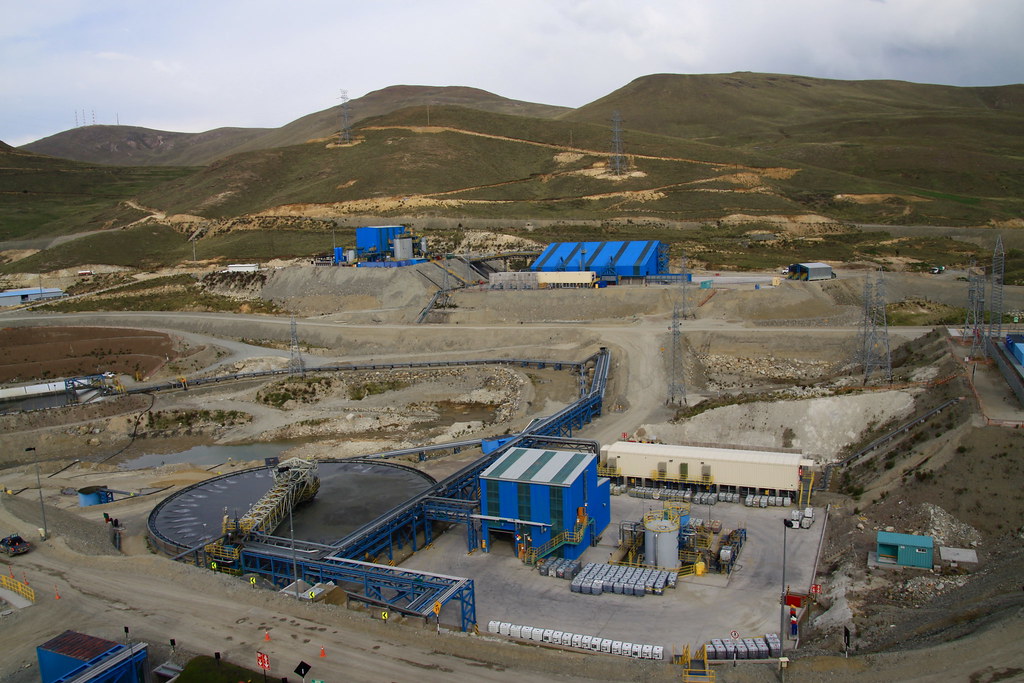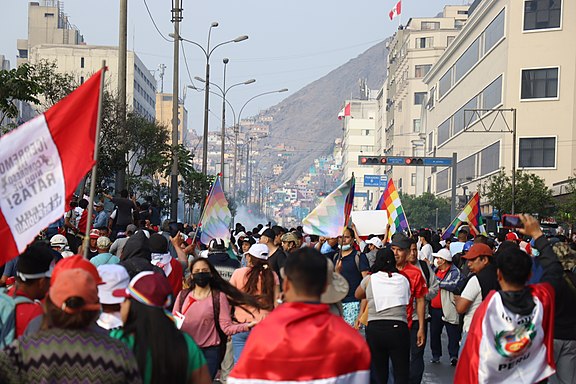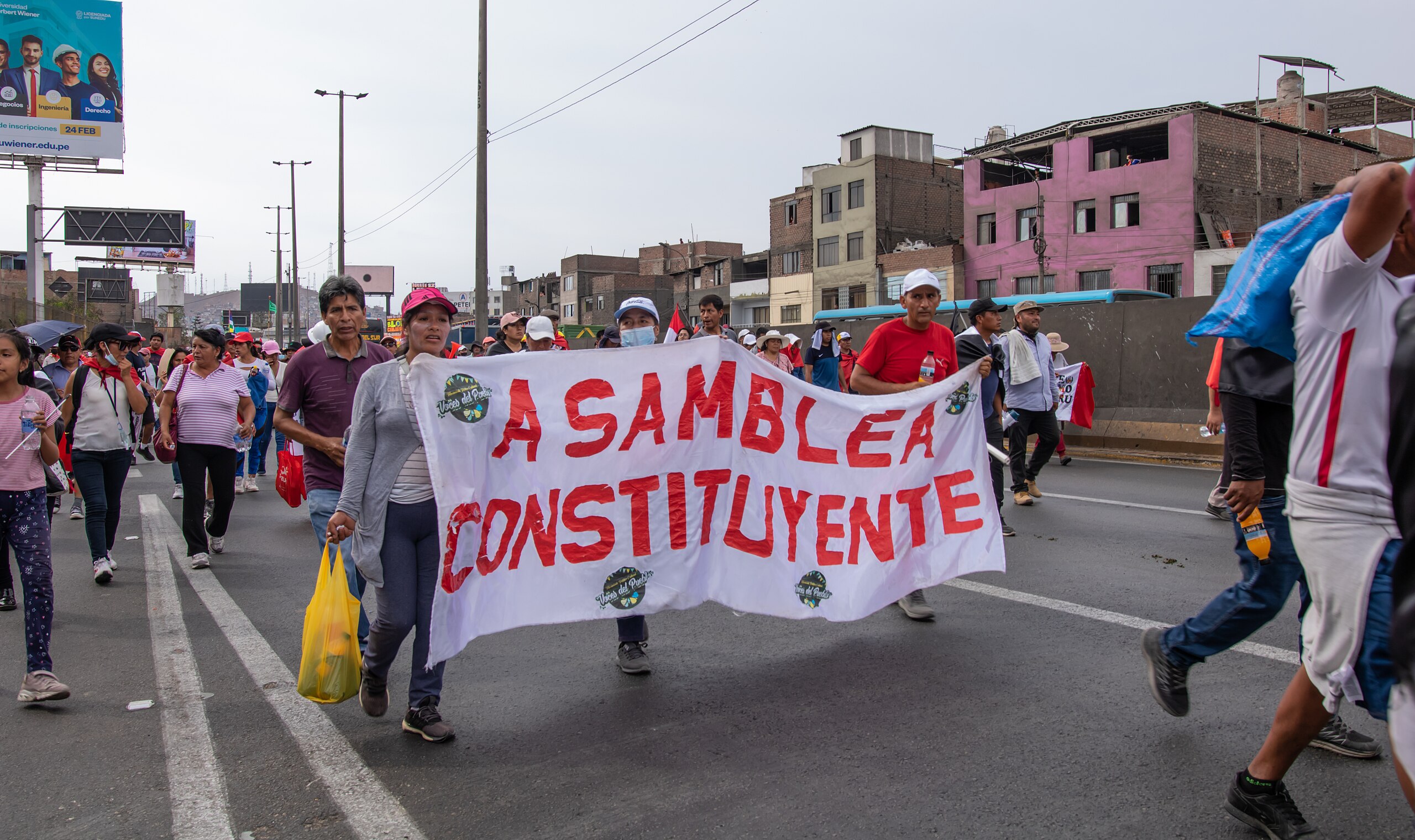Over the weekend of Peru’s independence day from July 27-29th, tens of thousands of protestors took to the streets across Peru to denounce the continued rule of Dina Boluarte’s government, who took power through a coup in December 2022 that saw the ousting and arrest of former president Pedro Castillo.
Boluarte’s government has become known for its violent suppression of popular protests, with the Peruvian army and national police killing over 70 people in the past two years, the majority indigenous and peasants—as reported by Amnesty International.
Additionally, Amnesty called upon Canada to suspend all arms exports to Peru, a call that has largely been ignored by Ottawa, who has continued their trend of consolidating support for the coup government.
“In the two months after Castillo was ousted and while Dina Boluarte’s usurper government was very shaky, there were mass protests. They killed 50 plus people in suppressing the protests. During those two months, Canada’s ambassador in Lima, Louis Marcotte, met with almost every different minister of the usurper government,” said Yves Engler, a Canadian foreign policy analyst and activist, in an interview with North Star.
“Mélanie Joly had a call with the Peruvian foreign affairs minister. I believe she maybe had a call with Boluarte. So they worked quite hard.”
Since the violent crackdown on demonstrations began on December 7th, 2022, the Canadian government authorized nearly $1 million worth of new military exports to Peru over a three-year period starting on February 6, 2023.
And despite the mounting evidence of human rights violations, Ottawa has refused to disclose if their military exports to Peru have been used in the deadly repression against the Peruvian people that has injured over a thousand.
While exact details on the most recent set of exports have yet to be confirmed, Amnesty International reports that from 2018 to 2020 Canada’s arms sales to Peru included “chemical agents, ‘biological agents,’ ‘riot control agents,’ radioactive materials, related equipment, components [or] materials.”.
Other interests at play?

So why did the Canadian government ramp up their support for an unelected government that was showing themselves to be increasingly more repressive and undemocratic? Maria Cueva of the Quebec-Peru Solidarity Committee provided North Star with an explanation:
“Currently, [Canada] has mining companies that operate there, and the government also sells arms to Peru. That’s the point of interest, because we have lots and lots of minerals. That’s why they continued their support. And Pedro Castillo’s government didn’t want to renew the contracts. With Dina Boluarte, they have been renewed. That’s it. And the people don’t want the mines because they contaminate the whole environment, their territory.”
Peru is a hot-spot for resource extraction. It is the world’s second-largest producer of copper and has huge gold, silver, zinc, and lithium reserves—amounting to around $56 billion in open mining investments from companies like the controversial Glencore.
Nearly a fifth of those investments are owned by the 70 Canadian mining companies active in the country, which is equivalent to 4.5% of the country’s GDP. In April of last year, Boluarte’s government announced they would grant lithium mining permits to a subsidiary of the Canadian mining company, Plateau Energy Metals, in a move to privatize more of the countries’ lithium reserves—which was met with resistance from indigenous communities in 14 of Peru’s regions.
The mining industry is also a hot-spot for conflict in the country, Engler explains: “There’s lots and lots of conflicts. I’ve seen reports going back 10 or 15 years ago, that said 40% of all social conflicts in Peru were around mining with Canadian companies… all kinds of people have been killed by security forces at Canadian-run mines.“
He continues: “[The Canadian government] provides all kinds of very clear-cut diplomatic cover for the companies. So they’re very attuned to these interests… and this is not hidden, right?”
“They define Canada’s interest as principally the interests of Canadian companies operating in that country. Obviously that shapes how they look at things, and that shapes their willingness to provide cover for the overthrow of an elected president.”
A movement for a new constitution

It has been out of the struggle against the coup government and foreign mining companies and interests, that the movement for a new constitution developed. It is a broad coalition of over 700 organizations from different sectors of society, including trade unions, peasant and agrarian organizations, national producers, and even parts of the national police.
Luis*, a member of the movement, spoke to North Star about their demands: “Our main demand is precisely to be able to achieve a new constitution through a constituent assembly with, and for the people. Now, within the set of struggles that we are developing together with all the other popular organizations that exist at the national level, we have set out to achieve new general elections, the dismissal of [Boluarte] and the closure of the congress.”
Peru’s current constitution dates back to 1993, when it was developed under the dictator Alberto Fujimori, who was imprisoned for 25 years for human rights abuses until he received a presidential pardon from Boluarte’s government in 2023. The constitution, among other things, introduced many neoliberal economic reforms to Peru, César, also a member of the Quebec-Peru Solidarity Committee, explains:
“The current 1993 constitution that the Fujimori government, a dictator, developed, was used to sell the country, to sell our natural resources to all foreign companies, especially to Canadian ones […] These companies’ profits are truly monumental. It’s scandalous. And we can’t claim it, we can’t report it. Why can’t we? Because these contracts are enshrined in the constitution.”
Luis says that the movement for a new constitution has faced many challenges in gaining ground: “There is a panorama of repression and persecution against all the leaders who stand up or who think against the state.”
“And this persecution is expressed in concrete actions,” he adds. “It is in these circumstances that today the popular movement, after having suffered this reactionary stalemate against its struggles, is beginning to rise up again. And it is not easy, because now there is a very valid fear of massacres being carried out and being assassinated with total impunity.”
When asked what working-class people in Canada could do to support the cause of the Peruvian people, Luis responded that “it is necessary for each country to develop and organize its own struggles. Just as we are developing our struggles here, they are also developing their struggles there, right? Because transformation exists everywhere.”
“It is not because Canada is a so-called first world country that it cannot develop a revolution, a change, a transformation. It has to do it too. So it would help us a lot if they also develop their own struggles for the people and for the world. Every struggle that one develops serves the struggles of the world.”
*An alias to protect his identity

